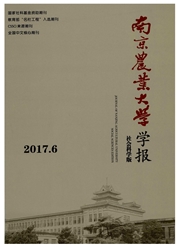

 中文摘要:
中文摘要:
农民工城乡迁移,是影响中国农业转型、城乡经济社会发展一体化的重要变量。借鉴推拉理论梳理影响中国农民工城乡迁移意愿的因素,区分并显化土地权益在其中的作用,提出城乡收入、就业环境、土地权益三个假说。并利用南京市的农民工1062份样本调查数据,以农民工流动方向为参照确定留在城市与返回农村作为各自对照组,通过多项分类logit回归分析计量各因素对不同迁移方向意愿的推拉作用。研究发现,城乡收入差距成为农民工城乡迁移的巨大动力;城市就业环境的好坏虽直接影响到农民工的经济权益,但在家庭总收入最大化的目标下他们对恶劣就业环境有较强的耐受力;土地权益则在农民工城乡迁移中起到了社会保障的作用。总之,规避风险并寻求家庭总收入最大化成为农民工城乡迁移行为决策的逻辑基础,今后土地制度改革和政策设计必须重视土地为农民工所提供的退路保障。
 英文摘要:
英文摘要:
The rural migrants' urban-rural migration is an important variable affecting China's agricultural transformation and the integration of urban-rural economic and social development. The "push-pull" theory is a very useful analytic tool for analyzing the rural migrant workers' willingness of the migration, and can highlight the land right's role in their wiliness. With the analysis based on this theory ,the paper put forward three hypotheses: urban-rural income, employment environment and land right. With 1062 samples about migrant workers in Nan-jing City, the paper used the Multinomial Logit Model to test the hypotheses. The samples are divided into experimental group( staying at urban)and control group( returning to rural)and vice versa to estimate the push-pull role of each factors on the different willingness of migration. The results showed that the influence of income gap between urban and rural is the most significant driving force, and that the rural migrants can endure the bad employment environment under the maximum of the household's total income even if the environment affects their eco- nomic rights directly. More importantly, land rights have an important effect and play the role of social security on rural migrants' urban-rural migration. Therefore, pursuing the maximum of the household's total income and avoiding risk at the same time has become the logic of rural migrants' urban-rural migration decision,and the reform and policy decision on rural land institution should take into account the exit security which land provides for the rural migrants in the future.
 同期刊论文项目
同期刊论文项目
 同项目期刊论文
同项目期刊论文
 Effect of household land management on cropland topsoil organic carbon storage at plot scale in a re
Effect of household land management on cropland topsoil organic carbon storage at plot scale in a re Methods and tools for integrated assessment of land use policies on sustainable development in devel
Methods and tools for integrated assessment of land use policies on sustainable development in devel 期刊信息
期刊信息
